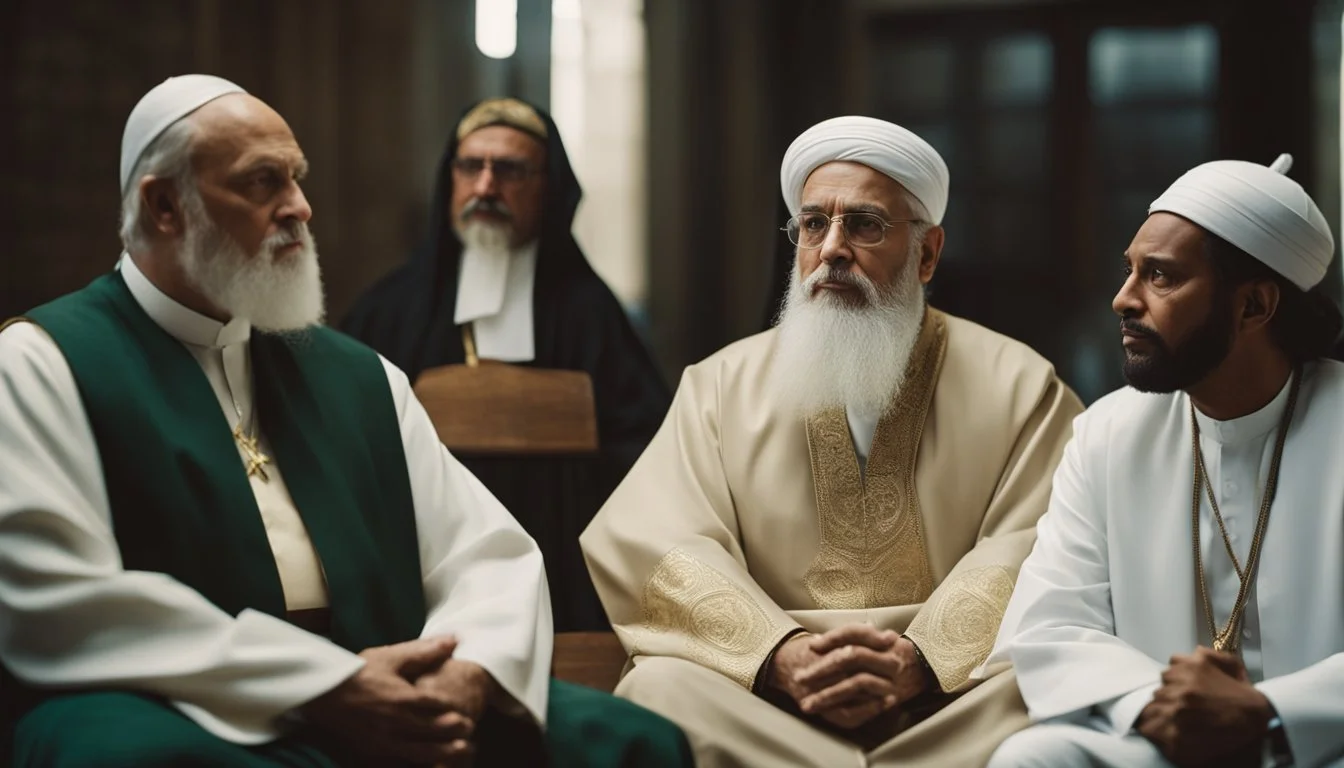5 True Crime Documentaries About Religious Leaders
Unveiling Dark Secrets
True crime documentaries have garnered substantial interest as they reveal the dark and often hidden sides of society. Within this genre, films about religious leaders stand out because they delve deep into the intersection of faith, power, and manipulation. These documentaries provide a nuanced look at how charismatic figures can leverage religious ideology to exert control over their followers.
For those interested in understanding the complexities surrounding these figures, documentaries offer a riveting examination of both the leaders and their congregations. By exploring the dynamics within these communities, viewers can better grasp how persuasion and conviction can sometimes lead to devastating outcomes.
1) 'The Family' by Anna Fifield (2019)
'The Family' is a Netflix docuseries that investigates a secretive Christian organization known as The Fellowship, or "The Family." Based on the work of journalist Jeff Sharlet, the series sheds light on the group's influence on American politics and global power structures.
The Fellowship operates through a network of powerful political leaders, businessmen, and influencers. Participants often connect through prayer meetings and spiritual retreats. Critics argue that the organization's secrecy and lack of accountability pose significant risks to democratic governance.
The series portrays how the group entwines faith with political power. Jeff Sharlet's own experiences living within The Family's communal house provide pivotal insights into their operations.
Anna Fifield's involvement adds additional layers, examining how the group underpins a modern theocracy. Her investigative approach contributes to understanding the intricate ties between religion and politics.
The docuseries also delves into how The Fellowship affects international relations, focusing on its influence beyond the United States. It raises critical questions about the separation of church and state.
This compelling series is recommended for anyone interested in the intersection of religion and politics. It offers a rare glimpse into a shadowy organization with profound implications.
For more information on 'The Family,' visit IMDb.
2) 'The Keepers' on Netflix (2017)
"The Keepers" is a gripping true-crime documentary series available on Netflix. It centers on the unresolved murder of Sister Catherine Cesnik in 1969.
Cesnik, an English and drama teacher, taught at Archbishop Keough High School in Baltimore. Her former students believe there was a cover-up involving church authorities.
The series investigates the suspected link between Cesnik's murder and A. Joseph Maskell, a priest accused of sexually abusing students at the same school.
This seven-part docuseries exposes painful secrets and raises questions about justice, trust, and institutional protection.
For more information on "The Keepers," visit Wikipedia.
3) 'Jonestown: Terror in the Jungle' (2018)
'Jonestown: Terror in the Jungle' is a four-part documentary series released in 2018.
The series examines the infamous Jonestown massacre of 1978, where over 900 members of the Peoples Temple died in a mass murder-suicide directed by their leader, Jim Jones.
Featuring interviews with survivors and experts, the docuseries provides a detailed look at the rise and fall of the Peoples Temple. It delves into how Jones convinced his followers to move to Guyana and eventually orchestrated the tragedy.
Scenes from the documentary give viewers insight into life in Jonestown, the psychological control exerted by Jones, and the events leading up to the final act. The storytelling is bolstered by archival footage and personal testimonies.
For more information, visit IMDb.
4) 'Wild Wild Country' on Netflix (2018)
"Wild Wild Country" is a compelling documentary series available on Netflix. It explores the story of Bhagwan Shree Rajneesh, also known as Osho, an Indian guru who established a large commune in Wasco County, Oregon.
The series focuses on the events surrounding Rajneesh and his close associate, Ma Anand Sheela. Their attempt to create a utopian city led to significant conflicts with the local residents and authorities.
The documentary sheds light on the complex dynamics within the Rajneeshpuram community. It delves into themes of power, spirituality, and law enforcement.
Released in 2018, the series spans six episodes, capturing interviews, archival footage, and dramatic reenactments. It's a fascinating look at how a controversial figure and his followers impacted a small town and sparked a national scandal.
For more details, visit the Wikipedia page.
5) 'Children of God' by Noah Dietrich (2007)
This documentary delves into the lives of individuals who grew up in the controversial Children of God cult, also known as The Family International. Directed by Noah Dietrich, the film takes a personal approach, exploring the experiences of those who managed to escape the group's control.
The filmmaker, a former member himself, revisits his past and reconnects with others who have left the cult. The firsthand accounts highlight the cult's manipulative practices and the psychological impact on its members, especially the children born and raised within its confines.
Notable figures such as David Berg, the cult's founder, and Ricky Rodriguez, a former member, are featured, providing deeper insight into the harsh realities faced by followers. The documentary presents a chilling look at how religious manipulation can profoundly affect individuals' lives.
For more information, visit the IMDb page of the documentary.
Historical Context and Impact
The rise of religious movements and the influence of charismatic leaders have significantly shaped societal structures and individual lives. Their prominence and subsequent controversies have led to a complex interplay between faith and authority.
Rise of Religious Movements
Throughout history, religious movements have often emerged during periods of social upheaval or existential uncertainty. During the 20th century, numerous new religious movements (NRMs) surfaced as people sought spiritual alternatives to mainstream religions.
In the 1960s and 1970s, the counterculture era saw a surge in the formation of these groups. They provided a sense of community and purpose, particularly appealing to the youth. Jim Jones' People's Temple and the Branch Davidians led by David Koresh are notable examples. Their promises of salvation and a paradisiacal future attracted many followers, leading to tragic outcomes.
Cult dynamics often involve strict adherence to group norms and the charismatic authority of leaders. Social isolation and psychological manipulation are common tactics used to maintain control. These movements reflect broader societal trends, like the quest for identity and belonging, highlighting the impact of religious ideology on social behavior.
Influence of Charismatic Leaders
Charismatic leaders play a pivotal role in the formation and perpetuation of these movements. Their personal magnetism and persuasive communication attract followers, fostering a loyal and sometimes unquestioning base.
Jim Jones of the People's Temple, David Koresh of the Branch Davidians, and Warren Jeffs of the FLDS are prominent examples who used their influence to assert control over their followers. They often claim divine inspiration, positioning themselves as intermediaries between their followers and a higher power.
Such leaders often exploit their followers' vulnerabilities, enforcing conformity and obedience. The manipulation tactics employed can intensify over time, leading to tragic outcomes. The Jonestown mass suicide and the Waco siege illustrate the devastating effects of such influence.
Charismatic leadership in NRMs underscores the power dynamics within religious movements, demonstrating how authority and belief intersect to shape communal and individual destinies.
Psychology of Religious Leaders
Religious leaders often display complex psychological characteristics that can significantly affect their followers. Two prominent aspects include their tendencies toward narcissism and their sophisticated manipulation tactics.
Narcissism and Power Dynamics
Narcissism in religious leaders is marked by a grandiose sense of self-importance and a need for excessive admiration. They often present themselves as uniquely enlightened or chosen figures, creating a significant power imbalance. This narcissistic behavior can foster intense loyalty and dependency among followers.
Such leaders may exhibit charismatic leadership qualities. They command a strong presence and articulate a compelling vision that attracts and retains followers. Their ability to inspire often masks their self-serving motives, reinforcing their authority and control.
Power dynamics in these contexts are invariably skewed. Followers may view their leaders as infallible, leading to uncritical acceptance of their teachings. This dynamic can perpetuate harmful behaviors and suppress dissent, creating an environment ripe for exploitation.
Manipulation Tactics
Manipulation tactics employed by religious leaders can be diverse, ranging from emotional appeals to more covert psychological strategies. Gaslighting is a common method, where leaders make followers question their own perceptions and beliefs, thereby making them more reliant on the leader’s guidance.
Isolation from external influences is another tactic. Leaders may encourage followers to sever ties with family and friends to reinforce loyalty. This isolation helps in creating a controlled environment where the leader's influence is unchallenged.
Leaders might also frequently change doctrines or rules. This unpredictability keeps followers off balance, enhancing their dependency on the leader to navigate the complex and shifting landscape of beliefs and practices.
By understanding these psychological tactics, one can better comprehend the powerful hold these leaders have over their followers.
Legal and Ethical Implications
True crime documentaries about religious leaders often spotlight significant legal battles and moral questions. These detailed insights offer viewers a comprehensive understanding of the legal charges faced and the ethical dilemmas sparked by these leaders’ actions.
Criminal Charges and Trials
Religious leaders featured in true crime documentaries often face significant legal repercussions. Known charges can range from fraud, abuse, and murder. For example, Amy Carlson from the "Love Has Won" cult believed she was a reincarnated messiah. Her actions led to a detailed investigation culminating in severe criminal accusations.
Steven Avery, depicted in "Making a Murderer," provides another example where controversial trials come into play. Documentaries like "Wild Wild Country" show how Bhagwan Shree Rajneesh faced charges including conspiracy to evade immigration.
These legal proceedings are not just about punishment. They unearth the mechanisms through which these leaders maintained control and defrauded followers.
Moral Accountability
Beyond legal charges, ethical implications play a crucial role. Religious leaders wield influence, often convincing followers to engage in harmful or criminal activities.
Documentaries explore how these actions raise moral questions. They look into how far leaders go in manipulating beliefs for personal gain. This includes exploiting faith for financial gain or emotional control.
"Moral Accountability" requires understanding the responsibility of leaders who fail their followers. This involves not only their direct actions but also the conditions they create that lead to suffering or criminality. The films present a critical view of these ethical breaches, prompting viewers to consider the broader impact of these leaders’ moral failures.







